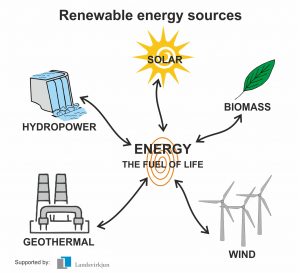Renewable energy
Renewable energy sources is energy from sources that are naturally replenishing but flow-limited such as hydropower, solar energy, biomass energy, geothermal energy and wind energy. The energy keeps on renewing itself and does not diminish therefore it is in balance. Renewable energy often provides energy in four important areas like electricity generation, air and water heating or cooling, transportation and rural energy services.
Renewable energy sources such as solar energy, wind energy, geothermal energy, and tidal energy, are sustainable energy sources.
Renewable projects such as the damming of rivers to generate hydroelectricity or the clearing of forests for production of biofuels are not considered sustainable.
Iceland generates 99% of its energy from renewable hydroelectric and geothermal sources. The National Power Company of Iceland generates three fourths of this energy from hydroelectric power, geothermal energy and wind, making it one of the largest producers of renewable energy in Europe.



 This project (EDU-ARCTIC) has received funding from the European Union’s Horizon 2020 research and innovation programme under grant agreement No 710240. The content of the website is the sole responsibility of the Consortium and it does not represent the opinion of the European Commission, and the Commission is not responsible for any use that might be made of information contained.
This project (EDU-ARCTIC) has received funding from the European Union’s Horizon 2020 research and innovation programme under grant agreement No 710240. The content of the website is the sole responsibility of the Consortium and it does not represent the opinion of the European Commission, and the Commission is not responsible for any use that might be made of information contained.